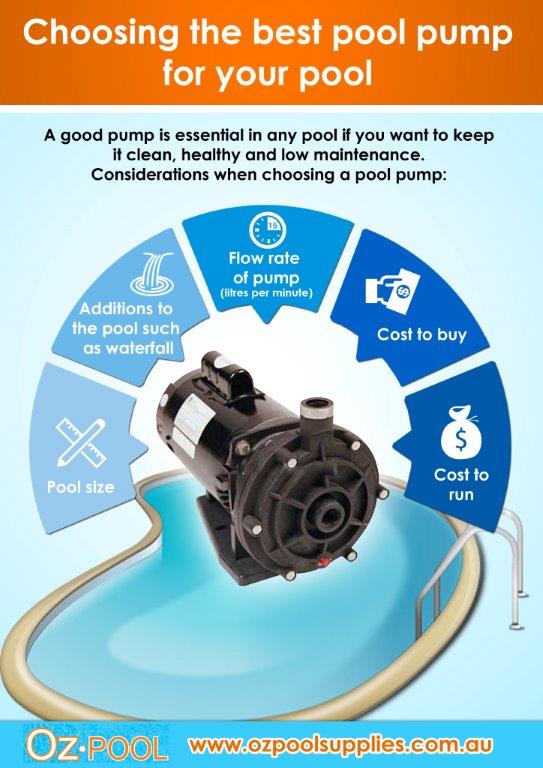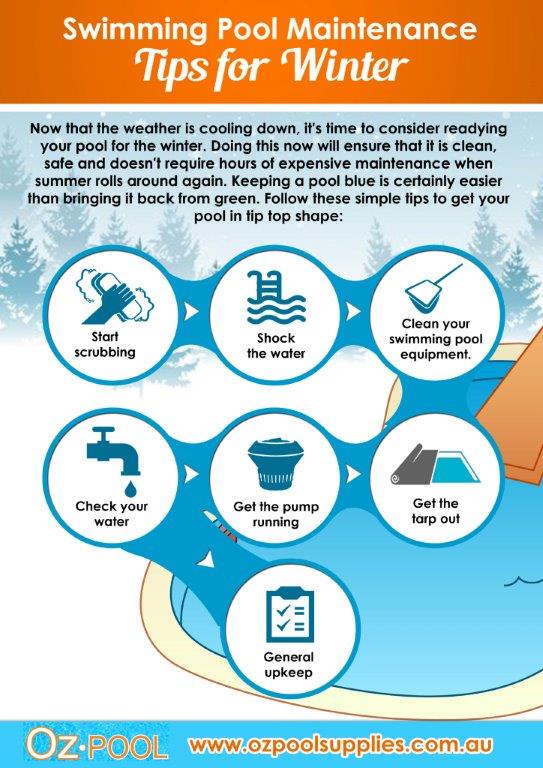We are here to help! Call us on 1800 642 688
Categories
Best Sellers
NOW SHIPPING OUTSIDE AUSTRALIA
What Are The Legalities Around Owning A Swimming Pool?
You may have owned a pool for a long time, you may be moving to a house with one or you may be considering getting one installed. All of these have one big consideration: Legal requirements. Even if you've owned a pool for years, there's a chance you might not be following all the rules. These change occasionally too, so you might not be up to date. So here is a quick checklist so you can be sure, no matter what pool you may have or might be getting, that you're safe.
Fencing
This one is a bit of a 'no brainer'. It is required for all pools to have a fenced enclosure. This is most importantly to prevent any mishaps with young children. Your pool fence must:
- separate your pool from your neighbourhood
- separate your house and your pool
- it must have a height of at least 1.2m, and be at least this far from any other object (such as a BBQ)
- the bars are no more than 10cm apart, and the gap at the bottom should be the same
- The gate should open outwards, and have a lock attachment
Walls
If your pool is connected to your house or very close to, then this area but be entirely enclosed. Any windows or doors that lead into the area must also have locks.
Signage
A CPR or equivalent sign must be placed in the area of the pool. Although it is not a requirement as of yet to be properly trained in resuscitation, it is highly suggested.
Selling or leasing your property
In some states (such as Queensland), should you be selling or planning to lease the house you must present a pool safety certificate. This can be issued by an authorised swimming pool inspector. As long as you follow the guidelines in this article you should be able to obtain a certificate without worry.
Registration
You must have your pool registered in most states.
Insurance
While it is not compulsory to have insurance for damages that occur in your pool, you should definitely consider having some. Even with posted warning signs and telling people swimming that they are doing so at their own risk, you are the one liable should anything happen. Because of this, you should make sure that your insurance reflects this.
Even when we do not consider what is 'legal' about owning a swimming pool, there are still many things that are 'right'. You don't want any accidents to occur in your pool, and having these safety measures in place should be done even if they weren't a legal requirement. Drowning is still a major cause of death for children, simply because they walk too close to a pool or don't have adequate supervision. If you are not sure if your pool is entirely safe, contact us and we should be able to point you in the right direction.
Buy A House With A Pool Or Put One In?
 Having a pool is a lot of fun for the whole family. Not only is it fun, but swimming is great for your health and also a great way to keep children occupied. Now if you don't already own one, you are faced with two choices: buy a house with a pool or build one yourself. Both of these are pretty daunting. But, if you are ready to commit to a pool, then below is a comparison of how to go about it.
Having a pool is a lot of fun for the whole family. Not only is it fun, but swimming is great for your health and also a great way to keep children occupied. Now if you don't already own one, you are faced with two choices: buy a house with a pool or build one yourself. Both of these are pretty daunting. But, if you are ready to commit to a pool, then below is a comparison of how to go about it.
Buy A House With A Pool
The most obvious advantage of buying a house with a pool is the fact that you have one ready to go. You don't have to deal with all the hassle of permissions, design and organising the builders. Depending on how well it was maintained you may have some cleaning or repairs on your hands, but for the most part the pool should be good to go, but ensure you get a pool inspection done before you buy the property. Another benefit for this option is if the current owner is desperate to sell you might be able to snag a bargain and save some money.
The biggest disadvantage of buying a home with a pool already installed is the fact that you won't have any input into the design. Pool appearance can vary a lot with every house and no one style will work best for everyone. It is entirely possible to find a great house with a great pool that suits you.
Build A Pool Yourself
If you decide to build your own pool you may have to wait a while to get it, but you will have far more freedom: you will have input to the design and should be able to get exactly what you want. You will be able to have the 'perfect' home without having to settle for something you're not entirely happy with. Be sure that when you buy your house you will have ample room for the pool and it’s probably a good idea to get a couple of pool builders in to assess your needs before you buy the house and ensure that there won’t be any obstacles later down the track, so if you have found your ideal house bring along a professional to assess the area before you buy.
Neither choice is better than the other, it's more a decision on your preferences and your personal preferences plays a massive role in this decision so be sure to have a good think before you choose.
Let us know if you need advice in this area: we are here to help!
Check our range of pool supplies >
What Are All The Costs Associated With Building A Swimming Pool
The ultimate addition to a house will always be the swimming pool. It is an excellent source of entertainment and a way to keep the kids busy, and it's also a great way to stay healthy in your own home. If you long for a pool but are happy with the house you are in and don't want to move, then your next step is to have a pool built. But there are many 'hidden' costs associated. In this article we've tried to include many of the things you can expect to see, so hopefully there will be far less surprises down the road.
Excavation
The first step is excavation. That is of course, if you chose to build an in-ground pool. If you've never done anything involving groundworks, the cost can be far more than you might imagine. Depending on the size of your pool and the area you live in, prices can vary a lot. Look around for a good quote from a reputable company.
Foundations
Then there is of course the actual pool. There are different styles and materials to match everyone's personal taste.
Choosing a simple design and a cheaper material can save you a bit of money but there will be many options so do the research and make the best choice for your needs.
Filter
Next up is your choice of pool filtration system. This is a very important aspect of your pool as it will the major factor in keeping your pool clean and safe to swim in. There are three major types: cartridge, sand and diatomaceous earth (DE).
No matter which type you choose, be sure the model will able to handle the water amount.
Cleaner
Though the filter will do some cleaning, it will only catch the smaller particles. For debris such as leaves and insects, you'll need a pool cleaner. There are some that will match specific pools better than others, so shop for your pool type. You can start here: http://www.ozpoolsupplies.com.au/automatic-pool-cleaners.html
Strainer Basket
This works with both the filter and the pool cleaner. It will catch the debris for disposal.
Pool Cover
While it is not necessary to have a cover, it's certainly beneficial. It will greatly reduce the amount you have to clean your pool in the colder months. It can also help avoid any 'accidents' with smaller children, so if there are young ones around you it's highly suggested you get one.
A cover will also reduce water evaporation and if you intend to heat the pool, it will help to keep the ideal temperature for swimming.
Chemicals / Salt
You will need to carry out regular water tests on your pool water to maintain the correct chlorine, pH, salt, calcium, total alkalinity and stabiliser levels.
This sounds complicated but is actually very simple; you can carry out most of the tests with a 4 in 1 test kit.
For greater accuracy you can take a water sample into your local pool shop and they can tell you exactly what the pool requires to maintain the levels and keep it looking great all year round.
Pool Fence
These days majority of countries have rules stating that you must have a fence around the pool. Even in a country where you aren't required this is definitely recommended. It will keep small children out as well as pets, preventing any accidents or injury.
Extras
There are many little costs as well. Other pool equipment like a rake or net to scoop out large debris, safety signs, pool lights, and of course pool toys are all important. You'll likely need to take a first aid course too, and that will cost you a little also. If you're unsure, contact us for more details.
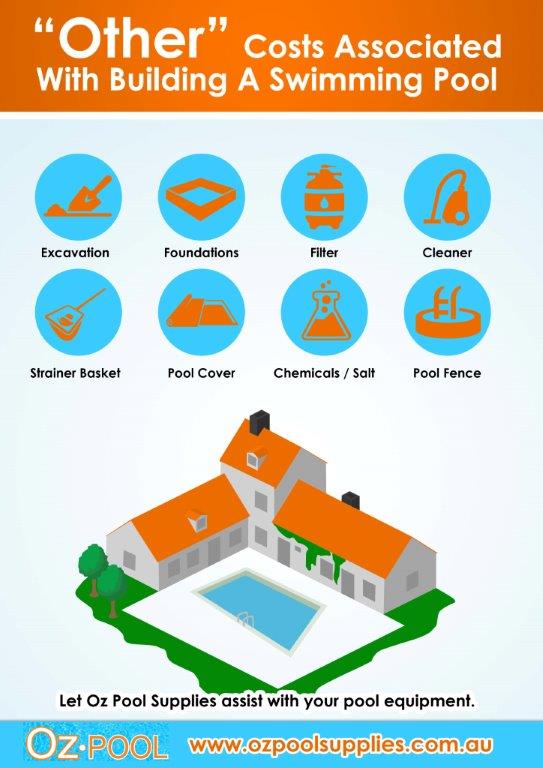
Swimming Pool Equipment Checklist
Swimming pool supplies are important for keeping your pool clean and well maintained. Whether you've only recently installed a pool or have had one for many years, being up to date with your equipment is always important.
Both the equipment that is installed and the extra supplies and accessories are vital for a safe and aesthetically pleasing pool. By running through these checklists, you can see what you have, don't have and what might need replacing.
Installed Equipment Checklist
Pump Assembly
This piece of equipment keeps the water flowing through the pool's filter, keeping it clean. All pools should come equipped with this, but if you notice any damage consider replacing it. There are now more energy efficient systems with automatic timers that can save you a lot of money in the long run.
Filtration System (sand, or cartridge)
The same is applied for the filtration system; you should have one already, but should you see any damage replace it. Sand or media should be changed every 5 years. Cartridge elements need to be cleaned regularly and should be replaced every 2-3 years depending on wear.
Automatic Pool Cleaner
It's rare to see a pool that does not have an automatic pool cleaner as they are so convenient and maintain your pool with little maintenance themselves. The two most common types are suction and robotic. Suction cleaners are attached to the skimmer box by many hoses and are cheaper, whereas robotic cleaners are attached by a low voltage power cord, but are more pricey and have to be cleaned out regularly and are not designed to ‘live’ in the pool
Pool Heater
While certainly not necessary these are great to have in the pool so that its usefulness can be extended into the winter months. There are natural gas, LPG, solar, heat pumps and electric pool heaters on the market.
Pool Lights
These are also not necessary for a pool but look great and allow the pool to be swum in safely during night time. You have the option of either LED or halogen. If you are considering installing pool lights, talk to us for more details and a quote.
Supplies and Accessories Checklist
Pool Cover
Pool covers are not just for keeping leaves and debris out of the water, they can also help extend the swimming season by retaining some heat in the pool. There are many types on the market in different materials and boasting added effects.
Pool Leaf Rake or Pool Broom
Excellent for getting out debris and the occasional lost tennis ball, a pool net or rake is one of the handiest tools to have by the pool. The pool broom is an essential piece of pool equipment for everyday use and should be used to brush in your swimming pool slat.
Safety Equipment and First Aid Kit
No pool is complete without safety equipment. A swimming safety sign (CPR sign) should be placed by the pool. Make sure you are familiar with the guidelines on the chart. It is advisable to have a first aid kit kept within quick and easy access to the pool area
Thermometer
An in-pool thermometer is always handy to have so you know what temperature you'll be swimming in. They aren't expensive and come with a tether for easy access. There are now also some fun designs to choose from.
Test Strips
Test strips are excellent for checking the pH, chlorine, and calcium contents of your pool. Alternatively a great thing to own is a 2 in 1 or 4 in 1 test kit. These a mini test kits and give a great indication to the balance of your pool. Checking your pool every so often can help make sure it's safe for use.
This list could go on all day about the various things you can have by your pool to make your swimming life safer, cleaner and more enjoyable. Here are just the basics. The best thing you could do is note what you do have, then give us a call to discuss options for what you need. And don't forget to grab a few pool toys for the kids ......oh and the big kids!
Check out our ranges:
Pool pumps
Pool filters
Pool equipment
Pool toys
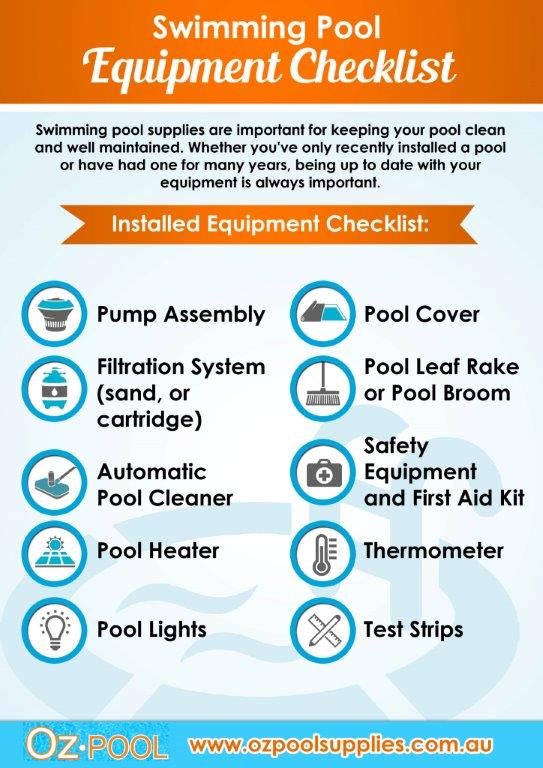
Swimming Pool Maintenance Tips for Winter
Swimming Pool Maintenance Tips for Winter
Now that the weather is cooling down, it's time to consider readying your pool for the winter. Doing this now will ensure that it is clean, safe and doesn't require hours of expensive maintenance when summer rolls around again. Keeping a pool blue is certainly easier than bringing it back from green. Follow these simple tips to get your pool in tip top shape:
- Start scrubbing. Most likely your pool won't be swum in all through winter, so get it as clean as possible to avoid a build up of algae. Scrub the tiles, getting down into the grout and in any corners and cracks. Your automatic cleaner will have certainly picked up much of the debris and algae through the summer, but giving it an extra clean will mean less trouble down the road. Pay extra attention to any part your cleaner might not get to normally.
- Shock the water. When you shock a pool by adding a high dose of chlorine it kills anything in the pool currently, and keeps the water cleaner for longer while not in use. Your local pool shop can advise you on how much to put in, and give you the appropriate products that you will need. After the pool is thoroughly chlorinated, a couple of hours with the pump running will even the product throughout the water.
- Clean your swimming pool equipment. Clean your filters, skimmers, automatic cleaner and any other cleaning equipment involved with your pool. This will help in the long run and stop any algae or debris from settling in the equipment and festering in disuse. Any scum on the filter after winter will be very hard to remove, so clean with a filter cleaner and degreaser from the pool store.
- Get the tarp out. A pool cover or blanket will stop leaves falling onto the surface of the pool and greatly reduce the amount of work needed to maintain the water. Leaves may seem innocent enough to be allowed to fall in, but they are the most common causes of pool imbalances and problems. The cover will also reduce water evaporation so less topping up. Be sure to let some air in occasionally though, as algae can grow faster if the pool is always covered.
- Get the pump running. Even if the pool is not in use, the pool filters and cleaning system should be run at an optimum four hours a day, and the skimmer should be checked occasionally and emptied when nearing fullness. Doing this will reduce cleaning later, and will check that all your equipment is running normally.
- Check your water. Before sitting back and resting after the hard work, check your pH, alkaline and of course, your chlorine levels. You should ensure the levels are all normal, taking into account the shocking of the pool. Ask your local pool store about a test kit and be sure to ask for your correct levels to make sure everything is as it should be. Do this routinely every two weeks or so.
- General upkeep. Lastly, through the winter months there are a few things to double check while doing your bi-weekly maintenance. Check your water level against your skimmer box, it should be halfway up. Check the pressure gauge on your filter doesn't say 'backwash' and if you have pool lights, turn them on for half an hour or so to avoid any moisture in the fittings.
Follow all these steps and consult Oz Pool Supplies for advice, and your pool will be up and running in no time in summer.
Click to enlarge
Oz Pool Supplies’ Guide to Choosing Swimming Pool Chlorinators
Oz Pool Supplies’ Guide to Choosing Swimming Pool Chlorinators
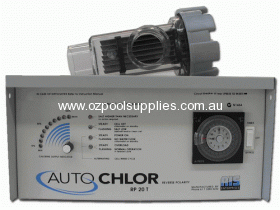 Having a salt water pool is quite advantageous rather than the standard chlorine pool, as they have only 0.5 to 1.0 ppm (parts per million) of chlorine in contrast to a 3.0 to 1.0 ppm, not to mention the added chemicals used to prevent algae.
Having a salt water pool is quite advantageous rather than the standard chlorine pool, as they have only 0.5 to 1.0 ppm (parts per million) of chlorine in contrast to a 3.0 to 1.0 ppm, not to mention the added chemicals used to prevent algae.
The salt cell of a salt water chlorinator is the main active part in how the system works. It is a chamber with plates that are electronically charged oppositely, similar to magnets. When salt is added into the system, it flows between the plates, reducing the opposite charge and in doing so, converting some salt into chlorine. This produces chlorine in a much cleaner fashion than buying bags of it, and in having such clean production, the incidence of algae is reduced and germs and bacteria in the pool are wiped out.
There are many different types of swimming pool chlorinators on the market, among them being the Davey, Autochlor, Zodiac, Hurlcon and Onga salt water pool chlorinators. When looking at the different systems, not only should you be looking for the best performance and least cost, but for the one that will suit your pool the best. If this is an issue for you, consult the team at Oz Pool Supplies for information.
Davey and Hurlcon salt water chlorinators have no set price, so contact Oz Pool Supplies for costs for your pool. Autochlor has a large range of salt water chlorinators and price ranges, starting at a small, non-self cleaning system with no timer at $475, and ending at a large self cleaning system with a battery backed up timer at $1,345. Zodiac has two main styles of salt water chlorinators, Ei and Tri. Ei is cheaper, easier to install, operate and maintain, and costs anywhere from $565 to $625. The Tri system is more customised, starting from $699 for a compact system. For larger sizes a quote is needed depending on the pool. Onga Pentair Water systems range from $679 to $899, also depending on size.
Hurlcon salt water chlorinators have no set price, so contact Oz Pool Supplies for costs for your pool. Autochlor has a large range of salt water chlorinators and price ranges, starting at a small, non-self cleaning system with no timer at $475, and ending at a large self cleaning system with a battery backed up timer at $1,345. Zodiac has two main styles of salt water chlorinators, Ei and Tri. Ei is cheaper, easier to install, operate and maintain, and costs anywhere from $565 to $625. The Tri system is more customised, starting from $699 for a compact system. For larger sizes a quote is needed depending on the pool. Onga Pentair Water systems range from $679 to $899, also depending on size.
The lifespan of any of these systems generally relies on their upkeep. A well maintained salt water cell can last anywhere from three to seven years, and after that should be replaced. To avoid replacing too soon do not clean too frequently or improperly. Consult your supplier about proper maintenance when you buy the system, but generally once a season is what is required. The control board of the system has the same lifespan, but this varies regardless of maintenance.
Making the decision of which salt water chlorinator to buy is a big deal and many things must be taken into perspective. It must be compatible with your pool, produce enough chlorine for your pool to function normally and fit your budget. Choosing the correct one can change the quality of your pool and will give you a better alternative to the harsh chemicals used to balance the standard chlorinated pool. Ask us if you need assistance.
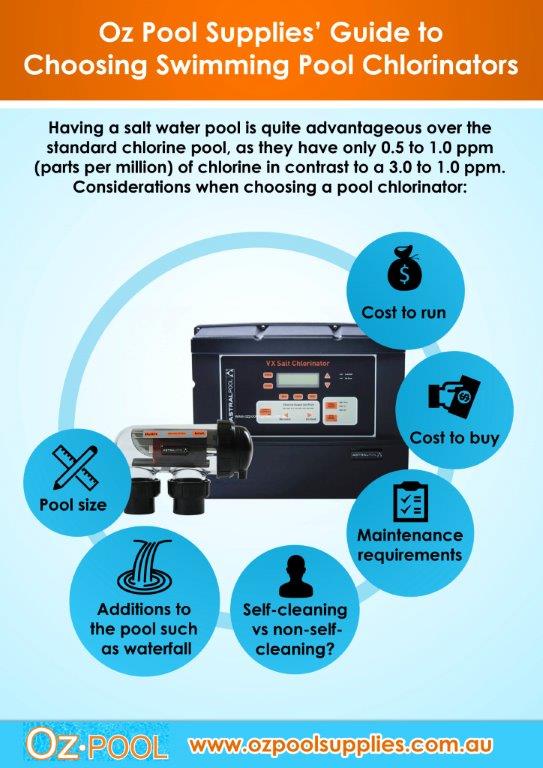
IMPORTANT UPDATE TO ENERGEX AND ERGON REBATES
Choosing the best pool pump for your pool
A pool pump is a vital part of any pool. By definition, an electrically operated water pump is the prime circulator of water in the pool. Water is forced through a filter, cleaned of debris and then returned into the pool. A good pump is essential in any pool if you want to keep it clean, healthy and low maintenance. If you use a salt chlorinator, the pump will circulate the water through the cell and sanitize the pool.
Which pump?
All pool pumps are rated on a scale of how much water they can circulate. This is referred to either in horsepower or watts. The higher the number, the more water the pump can handle. There is also flow rate. The flow rate is a measure of how fast the water is circulated, in litres per minute. Most filtration systems will have a set maximum rate they can handle. If this limit is passed it is possible the system will get damaged, so bear this in mind while choosing your pool pump. Filter systems are generally measured in diameter of the filter, this determining the flow rate. Depending on the volume of water you plan to circulate and the rate you want it to work at, you can match the diameter to the horsepower or watts of the pump. Another consideration is turnover time. This is the time it takes the pump to completely circulate the pool water through the pump and filtration system. The number differs, but the time to roughly aim for is 6-8 hours. That means within that time the full body water has been cleaned and sanitized. If the pump is too slow, it generally means you need one with more horsepower to cope with the load. However, a slower speed may also be a good thing, as slower filters clean much more efficiently as they can catch the smaller particles that would otherwise run straight though. This also reduces resistance in the pipes, reducing energy required to run the system. Take this into consideration also while choosing.
How much do they cost to run?
The last major factor in choosing which pool pump is right for you is the cost to run the system. Residential filtration systems are generally run for 4 hours a day in winter and 8-10 hours in summer. To save electricity costs, run the pump for between 6-12 hours (or a full turnover) with the pump being controlled by an electric timer. Some pool pumps, such as The Energy efficient Three speed pumps, have multiple motor speeds to reduce power consumption at times when full power is not needed. A smaller pump will cost less to both purchase and run, but keep in mind that it still has to fit the correct flow rate and turnover times for your pool. Extras in your pool such as a waterfall or spa will put extra demands on the pump, so take this into consideration also.
Conclusion
These are just a few of the considerations when selecting a pool pump. For the best results first time, contact Oz Pool Supplies and they will help you to choose a pump that suits your needs. Knowing details such as the volume of water, flow rate and turnover times will be beneficial to speed up the process and make the task a little easier.
